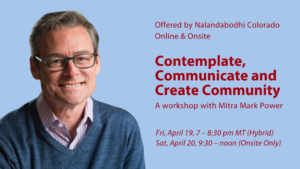If you want to know your past life, look into your present condition. If you want to know your future life, look at your present actions.
— Padmasambhava, eighth-century meditation master
My mom and dad have always maintained beautiful gardens. They invest countless hours of devoted care in the flowers, fruits, vegetables, and trees that adorn their home. Not only do they provide beauty and fresh nourishing food, but they also enjoy a more subtle, ongoing opportunity to engage in something hands-on that cultivates love and benefits others.
Karma is a loaded word and is often misunderstood. Literally, it can be translated as “action” or “cause and effect.” It is not deterministic or fatalistic. Karma is not something that happens to us; it’s like the shared ecosystem that we inhabit. It is the interdependent web of connection in which we all participate. While we are propelled by the momentum of our previous choices, we do have free will in the present moment.
Our behavior and experiencing the consequences of our actions is a lot like gardening. If you plant an apple seed and give it the causes and conditions it needs to flourish—sunlight, water, good soil, and time—it will eventually grow into a tree and produce apples. But if you plant a grain of sand, even if you give it all the same causes and conditions, you will not get an apple tree.
It is a similar process with our intentions and actions of body, speech, and mind. We can observe the mechanics of causality, and make informed decisions about what outcomes we would prefer. If we want to harvest positive outcomes, we plant positive seeds. We also need to be accountable for the negative seeds we sow, and take responsibility when we reap their results. Our experience really comes down to our attitude in the present moment and how we relate with our circumstances, now.
We can learn from the Buddhist dharma what is recommended for effectively practicing the path, and what should be avoided. The good news is that we have the ability to change. We can be of benefit to ourselves and others.
Third, at the time of death, I will be helpless. Because I create karma, I must abandon negative actions, and always devote myself to virtuous ones. Thinking this, every day I will examine myself.
Contemplation Exercise
- To start an analytical meditation session, find a quiet space, and set your intention.
- Do a few minutes of calm abiding meditation, and then slowly recite the verse.
- Engage your thinking mind with curiosity and creativity. Go beyond the words to experience the meaning that they convey. Allow yourself to deeply feel what they mean to you.
- During the session, you can periodically repeat the verse to refresh your thinking.
- Conclude with a few minutes of calm abiding meditation, and offer any goodness from the session to all beings.

Nick Vail is a Karunika (teacher) for Nalandabodhi who lives in Maine.
A single parent, he enjoys quality time with his son, being in nature, playing the guitar, singing, dancing,and meditation.






